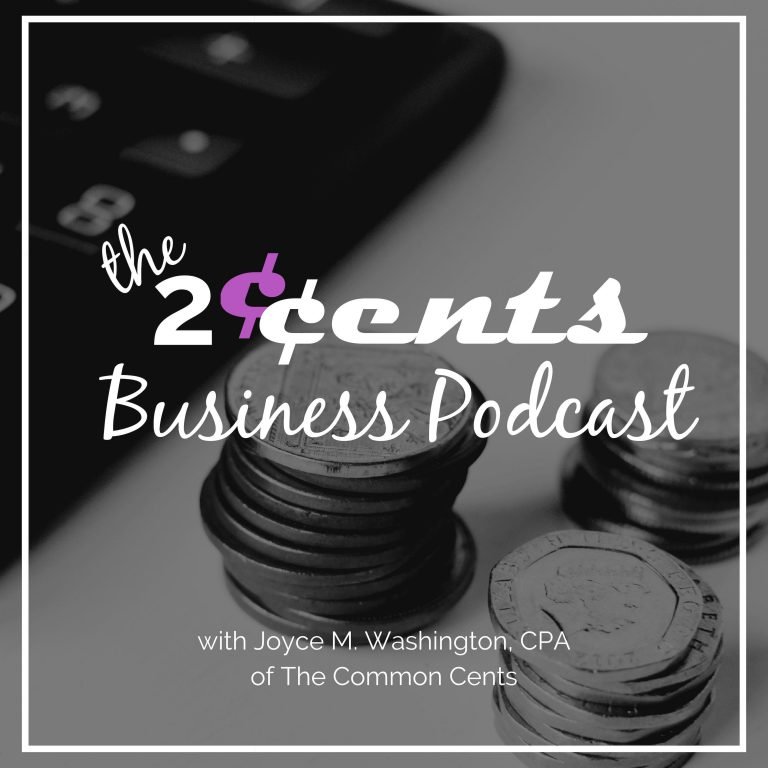by Joyce
This episode is a bit of a rant/what grinds my gears because I’m tired of seeing small business owners taken advantage of by so-called virtual bookkeepers.
What kicked this up for me was seeing a post about rules for a group that didn’t want there to be “negativity” in the group surrounding calling out inexperienced bookkeepers.
So in this episode, I run down why all of this bothers me, the ulterior motives of some group owners, why it’s hurtful to business owners and professionals…and what to do about it.
I also invite you to join the notification list for a rare sale that’s coming up for Black Friday (you can join here: thecommoncents.com/bootcamp)
by Joyce
It’s a simple question to which I have an in-your-face, dead simple answer. What’s getting in the way of your business growth? In one word…YOU!!!
(more…)
by Joyce
Before you make any phone calls, take some time to do some self-reflection. Reflect on your business and how it currently functions, what you do well and what you can do better. Then ask yourself, what functions do you want to outsource? can outsourcing help you perform some things better? and what is your budget?
Interview a few outsourcing providers just like you would if you were hiring an in-house staff person. Like choosing an in-house bookkeeper, accountant or payroll processor, ask “interview” questions. Here are
10 Questions you should ask. In addition, ask yourself if the provider’s style and available services coincide with your business’ philosophy and style. If not, you may be attempting to force a square peg into a round hole and what may have been a less expensive alternative in the beginning, may end up being a costly experiment. So choose wisely.
Quick Recap: decide to outsource; do some self-reflection on your business needs; interview a few providers (at least 2) and make a decision who your provider will be. Remember cheaper doesn’t always equal better.
Congratulations on deciding to outsource. That decision in and of itself is HUGE so give you’re some kudos for admitting that although you are a small business/solo practitioner, you can’t do it all. Believe me, as a small business owner, I can relate…
Hope this helps!
Joyce
PS. Please, keep in mind that just because you are outsourcing, you should never abdicate management…you should always keep “an eye on the store.” Your provider has a responsibility to you as a client and should take that responsibility seriously.
by Joyce
Having a good accountant/bookkeeper may not make or break your business’ success but with the current state of the US economy and the weakening US Dollar – it sure helps! A good accountant can have a HUGE impact on your bottom line…
Because they handle your money, choosing one is a big decision. Here are a few questions to ask the prospective accountant (or accounting firm).
- How many years has the accountant been in business? With the constant changes in the tax laws and accounting reporting requirements, someone with a minimum of 5 years experience is ideal since you want a business/firm that has been around and won’t go under on you.
- How many years of experience does the accountant have? Again, a minimum of 5 years is ideal…however, industry specific experience of 2-3 years is a good start.
- What industry are they proficient in? Depending on your industry, this question could be vital. You want an accountant/bookkeeper who knows the red flags for your industry as well as what to look for when reviewing your financial statements & taxes for errors.
- What is their response time and communication style? Response time should ideally be within 24-48 hours as a business courtesy; however, communication style is up to you. You should lean toward someone that communicates via similar media as you. For example, if you are proficient and comfortable with email/Instant Messenger communication, but your accountant is not…you may have an impasse regarding responsiveness. So keep media preference in mind.
- What is the size of the firm? This only matters in terms of services offered and requested and responsiveness. If you need quick turnaround for certain items, a 20+ person firm may not be for you. If you need 20 financial reviews done simultaneously, a 2 person firm may not be for you.
- What experience do they have with the software of YOUR choice (and accounting software in general)? Software experience is more important if you use either an abstract or complicated software package. Chances are if you use QuickBooks, Peachtree, or MYOB, your accountant/bookkeeper has had some exposure to it. Bottom line, you don’t want your new accountant learning to use the software of your choice on your dime… In my opinion, that really should be something they come to the table with.
- What are their levels/types of service? Most, not all, firms will have levels and/or types of services. After consultation, they will make recommendations to you regarding what they can offer you. It is ultimately your decision which services you use.
- What are the typical terms of their service agreement? Your prospective accountant should be able to outline for you the “typical” terms of the agreement such as acceptable methods of payment, due date, late fees/penalties, etc.
- Is it an open ended arrangement? In my opinion, the agreement should be open to the extent that either party may cancel the services upon notification. Acceptable methods of notification should be discussed.
- What is your comfort level/rapport with them? This isn’t necessarily a question to ask the prospect but rather something you should ask yourself prior to signing on the dotted line. You want to have a certain level of comfort with them, after all, they will be handling your business’ money & financial affairs… so if something just doesn’t feel right, don’t ignore it.
Having the answers to these questions is a good foundation for making this decision…If you need help or you have questions, please contact us. We’d be happy to help.
Joyce


